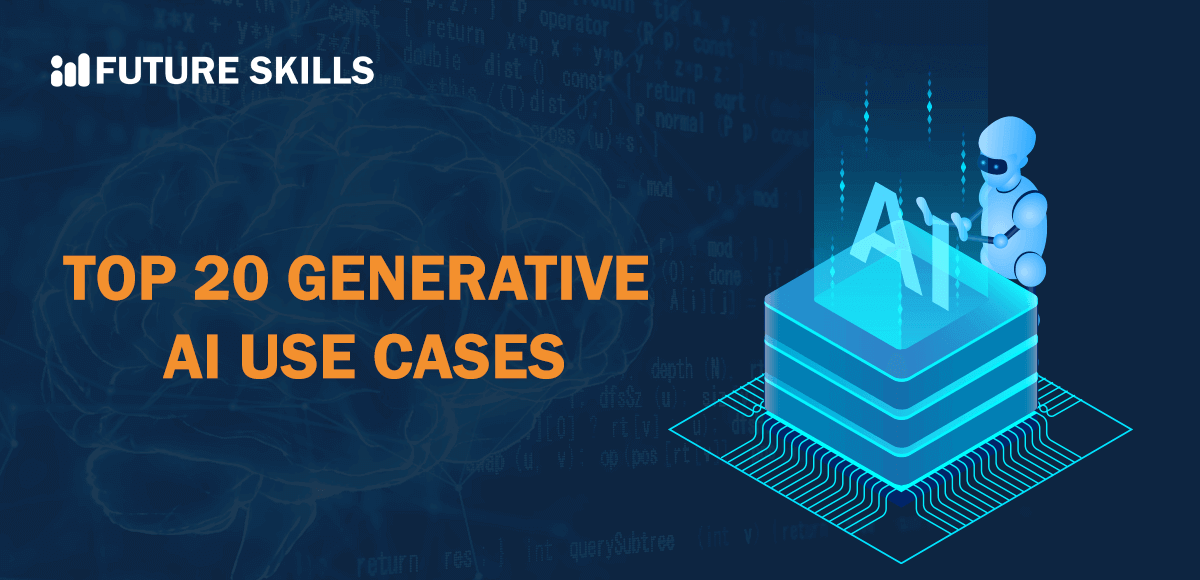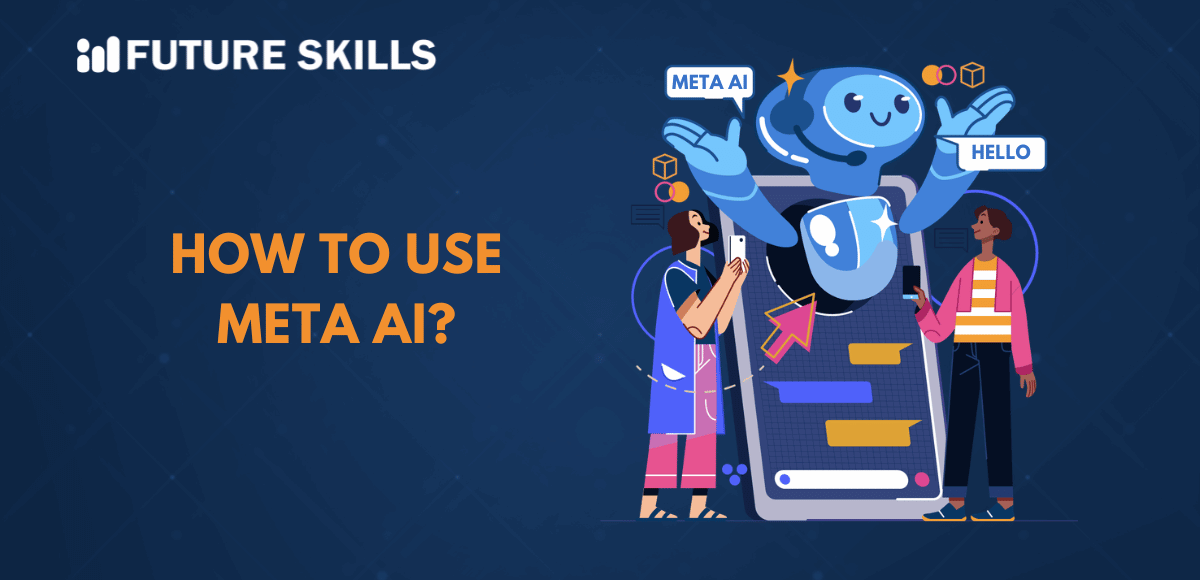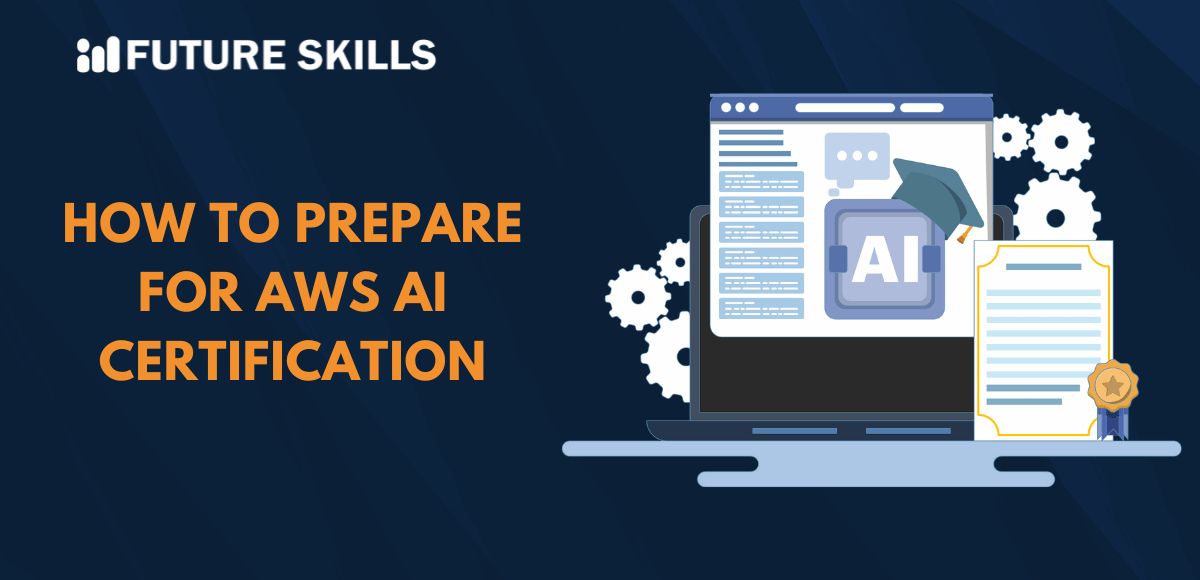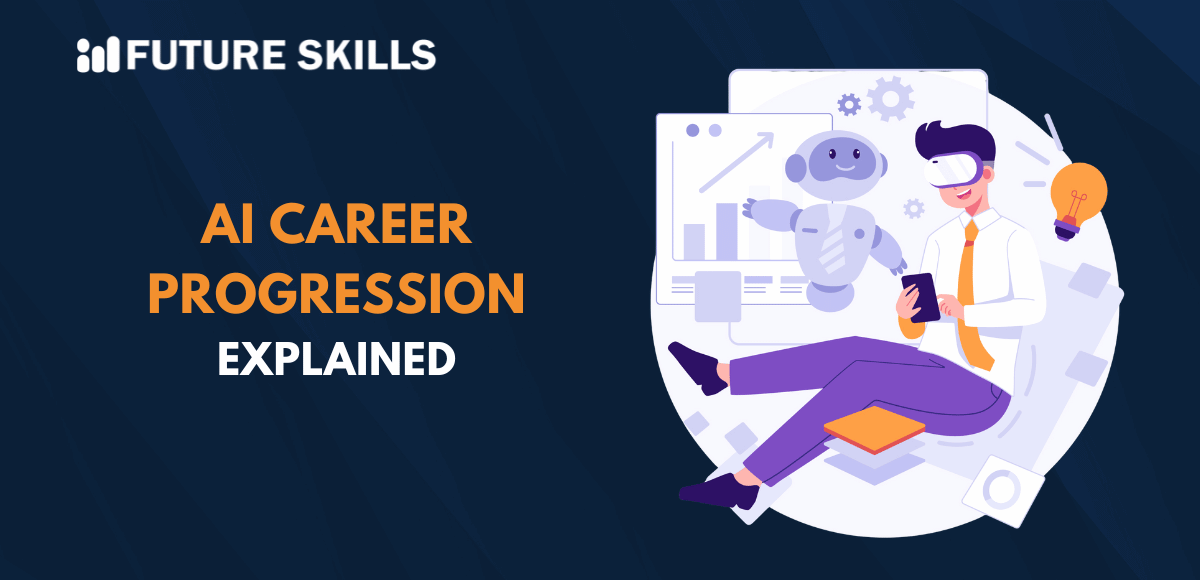Artificial intelligence has jumped from the pages of science-fiction novels and movies to the real world. The COVID-19 pandemic forced businesses to switch gears and make faster strides in technological advancements to support their digital transformation. At the same time, new and innovative technologies also help users with better and seamless experiences of digital solutions.
You can find the same themes in top generative AI use cases, such as applications of ChatGPT for creating content. You can read about the possibilities for generative AI applications in different scenarios with examples of top applications. On the other hand, it is important to explore the prospects for use cases of generative AI in the present and future. Let us find out the top ways in which you can use generative artificial intelligence in the following post.
Level up your AI skills and embark on a journey to build a successful career in AI with our Certified AI Professional (CAIP)™ program.
Definition of Generative AI
Before you look for an overview of generative AI use cases, it is important to learn about the basic concepts of generative AI. What is generative AI, and how is it different from traditional AI? The traditional applications of artificial intelligence focus only on detecting patterns, conducting analytics with accuracy, and identification of flaws. The intuitive aspect of traditional AI is restricted to suggestions for improvements and decision-making. On the other hand, generative AI focuses on generating data, which focuses on creating new text, video, audio, or other types of content.
Working of Generative AI
You can understand more about generative AI applications by learning about how it works. The answers to “What can generative AI be used for?” would point towards the two machine learning classes, such as generative system and discriminative system. Generative system refers to the systems which can generate text, audio, video, and other types of content by using computer-controlled systems. On the other hand, discriminative system points to the systems which differentiate the real from fake, such as morphed pictures or errors in text.
Generative AI serves as the foundation for some of the best AI use cases on generative and discriminative systems. Both systems are developed over neural networks and generate the desired output according to the input. Subsequently, the systems would use feedback for modifying internal operations to generate output according to the feedback. Most of the popular generative AI tools combine the two AI classes in the Generative Adversarial Network or GAN model. As a result, generative and discriminative systems can utilize different AIs for training and improving performance and output.
Level up your ChatGPT skills and kickstart your journey towards superhuman capabilities with Free ChatGPT and AI Fundamental Course.
Top Use Cases of Generative AI
Generative AI can produce new and realistic content within a few minutes. Most important of all, you don’t have to invest time and effort in obtaining the desired output. The different examples of generative AI uses to serve as a glimpse of the effect of artificial intelligence on the world. The whole world was discussing generative AI following the launch of ChatGPT in October 2022.
On top of it, Gartner has predicted that generative AI would be responsible for generative 10% of all existing data by 2025. You must also note the importance of generative artificial intelligence in transforming different sectors such as sales, healthcare, customer service, education, and marketing. Let us take a look at the top use cases of generative AI to understand their practical implications.
1. Generating New Images
The first set of popular generative AI applications draws references to the uses of generative AI for visual applications. You can refer to generative AI examples such as Midjourney to identify how AI serves a valuable role in generating images. Generative AI can help in transforming text into images according to specific location, setting, style, and subject. Users can rely on generative AI for creating visual material, which they can use for commercial applications such as advertisements. For example, graphic designers can use generative AI to create images suited to a brand’s values and beliefs.
2. Conversion of Images to Photos
The functionalities for image-to-image translation also offer another critical advantage in the applications of generative AI. It is one of the interesting AI use cases where you can obtain realistic images from semantic sketches. Such types of use cases can help the police by generating real images of suspected criminals from rough sketches. In addition, generative AI can also help you in obtaining multiple variations of real photos of an individual to find them.
Excited to understand the crucial requirements for developing responsible AI and the implications of privacy and security in AI, Enroll now in the Ethics of Artificial Intelligence (AI) Course
3. Video Prediction
The applications of generative AI could support video prediction abilities and effective prediction of discrepancies in a video. As one of the top generative AI use cases, video prediction involves understanding the spatial and temporal elements in videos. Subsequently, it generates sequences or patterns according to the video data for drawing predictions about potential situations which could happen in the future.
4. Sentiment Analysis in Text
The growth of generative AI has opened up the doors for AI to understand human emotions through sentiment analysis. In technical terms, such types of generative AI use to refer to opinion mining. The working of opinion mining involves the combination of text mining and NLP for identifying the emotional context associated with words in text. Users can also ask generative AI tools to implement words with specific sentiments in text.
5. Personalized Text Creation
One of the best AI use cases which leverages generative AI is content creation. Generative AI tools like ChatGPT have the potential to generate text according to distinct rules of grammar, tense, and vocabulary. Users could also capitalize on generative AI for personalizing their content and adapting to a particular type, tone, and audience.
Enroll now in the AI for Business Course to understand the role and benefits of AI in business and the integration of AI in business.
6. Super-Resolution of Images
You can also explore the possibilities for applying artificial intelligence to improve the resolution of images. Generative AI has the potential to process blurry images and turn them into high-quality images. The use cases of generative AI for enhancing the quality of images depend on the capabilities for generating new data according to the existing ones.
7. Programming Use Cases
The effectiveness of generative AI uses in content generation based on training data also supports their applications in programming. ChatGPT and its alternatives could help you in writing accurate programming logic according to specific requirements. On top of it, generative AI applications in programming also involve the effective debugging of code for identifying flaws. As a result, you can rectify the issues in logic before your code goes into production.
8. Text-to-Speech Translation Services
Text-to-speech is not a new concept in the world. However, the output of text-to-speech translation always resulted in producing unnatural voices, which never made sense. On the contrary, generative AI makes it easier to generate natural sounds like humans, which could serve a broad range of use cases.
9. Genetics Research
The applications of generative AI in the field of medical sciences have also been gaining traction. You can identify favorable prospects for genetic research by leveraging generative AI. The generative AI examples in genetics research can help in identifying the impact of changes in genes on gene expression. Generative AI can not only improve the speed of genetics research but also increases the chances of creating new gene therapies.
Want to gain practical skills in using OpenAI API and implementing API calls to facilitate LLM interactions, Enroll now in the Certified Prompt Engineering Expert (CPEE)™ Certification.
10. Industry and Market Trend Analysis
Generative AI applications can also be tailored for analysis of the industry and market trends in a specific sector. Business owners could use such generative AI applications for in-depth analysis of customer behavior and preferences. The comprehensive analysis of market trends can not only help businesses in improving user experiences but also fosters strategies for personalizing marketing strategies.
11. Travel and Tourism Recommendations
The responses to “What can generative AI be used for?” draw references to possibilities for using generative AI in tourism and hospitality sector. Users could rely on generative AI tools to obtain recommendations for travel according to previous journeys, geographical location, culture, and personal opinions. As a result, people could obtain recommendations that would help them make better decisions about travel and have enjoyable experiences.
12. Fraud Detection and Risk Management
Generative AI could help in addressing the concerns of fraud in banking transactions by ensuring proactive detection of malicious activity. Banks can train generative AI models with different fraudulent transactions or scenarios featuring loss with real-life data. As a result, generative AI can not only predict errors but also provide better options for drawing accurate market forecasts.
13. Personalized Teaching
The use cases for generative AI also focus on personalized teaching in the education sector. You can find interesting AI use cases with facility of personalized lessons and content for coaching students. Starting from recommending personalized lessons for students to creation of virtual assistants for tutoring, generative AI exerts a massive influence on education.
14. Public Health Management
The most promising generative AI use cases in healthcare also point to public health management. You can rely on generative AI in healthcare to support policymakers in finding more detailed analyses of demographic information. On top of it, public health management use cases also focus on designing targeted public health initiatives with generative AI.
15. Protection of Data Privacy
The applications of synthetic data created by AI could also resolve concerns about data privacy in banking and other sectors. Synthetic data helps in creating shareable data without using customer data. Furthermore, synthetic customer data could also support training of machine learning models to support banks in determining the eligibility of customers for loans.
16. Game Development
Generative AI could introduce improvements on a massive scale in the game development industry. For example, generative AI can help in creating realistic NPCs alongside supporting detailed analysis of player data for creating personalized game experiences. In addition, generative AI uses in game development also shed the limelight on user interface design and game testing.
17. Customer Support in Multiple Languages
The benefits of generative AI in business revolve largely around the ability to generate interactions with customers. Generative AI tools such as ChatGPT can boost customer service effectiveness by offering interactions in multiple languages. Such types of conversational AI tools can remove the barriers to communication between a business and its customers.
Become a certified ChatGPT expert and learn how to utilize the potential of ChatGPT that will open new career paths for you. Enroll in Certified ChatGPT Professional (CCGP)™ Certification.
18. Creation of Custom Emails
Businesses cannot undermine the significance of communication in the existing competitive markets. It is important to look for answers to “What can generative AI be used for?” in business communication with examples of creating custom email templates. Generative AI can help in creating personalized templates for emails that could resonate better with the target audience.
19. Ecommerce Audience Research
Ecommerce brands could also leverage generative AI for evaluation of customer data, such as social media interactions, search queries, and past purchases. Analysis of customer data can help brands identify the preferences, problems, and interests of customers, which could enhance product development.
20. New Ideas for Content Writing
Generative AI could also help you come up with new ideas for content writing with language processing capabilities of tools like ChatGPT. For example, the interesting AI use cases in content writing involve generation of relevant phrases, keywords, or topics according to existing trends or search queries of users.
The applications of AI tools like ChatGPT play a crucial role in establishing the search intent, which focuses on needs of the audience. Furthermore, generative AI also helps in creating the ideal structure for content writing, which can ensure a seamless flow of ideas. On top of it, generative AI tools can help in coming up with effective meta-descriptions by summarizing the content.
Final Words
The value advantages of generative AI highlighted in the multiple use cases show that it is a powerful force. As of now, most of the discussions around generative AI examples focus on its capability for generating new content. On the contrary, it is important to look for different ways in which generative AI could affect operations in various industries.
For example, the use cases of generative AI in content writing help in refining the output according to the desired objectives. Similarly, generative AI can also help artists in enhancing various aspects of their artwork, such as style, setting, color, or subject. In the long run, generative AI would have a massive transformative impact on the world. Learn more about the fundamental concepts of generative AI and how it signifies a major technological revolution.





